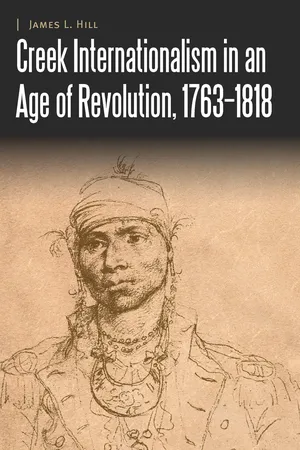
- 332 pages
- English
- ePUB (mobile friendly)
- Only available on web
Creek Internationalism in an Age of Revolution, 1763–1818
About This Book
Creek Internationalism in an Age of Revolution, 1763–1818 examines how Creek communities and their leaders remained viable geopolitical actors in the trans-Appalachian West well after the American Revolution. The Creeks pursued aggressive and far-reaching diplomacy between 1763 and 1818 to assert their territorial and political sovereignty while thwarting American efforts to establish control over the region. The United States and the Creeks fought to secure recognition from the powers of Europe that would guarantee political and territorial sovereignty: the Creeks fought to maintain their connections to the Atlantic world and preserve their central role in the geopolitics of the trans-Appalachian West, while the American colonies sought first to establish themselves as an independent nation, then to expand borders to secure diplomatic and commercial rights. Creeks continued to forge useful ties with agents of European empires despite American attempts to circumscribe Creek contact with the outside world. The Creeks' solicitation of trade and diplomatic channels with British and Spanish colonists in the West Indies, Canada, and various Gulf Coast outposts served key functions for defenders of local autonomy. Native peoples fought to preserve the geopolitical order that dominated the colonial era, making the trans-Appalachian West a kaleidoscope of sovereign peoples where negotiation prevailed. As a result, the United States lacked the ability to impose its will on its Indigenous neighbors, much like the European empires that had preceded them. Hill provides a significant revisionist history of Creek diplomacy and power that fills gaps within the broader study of the Atlantic world and early American history to show how Indigenous power thwarted European empires in North America.
Frequently asked questions
Information
Table of contents
- Cover
- Donor Page
- Series Page
- Title Page
- Copyright Page
- Contents
- List of Illustrations
- Acknowledgments
- Notes on Terminology
- Introduction
- 1. “Bring Them What They Lack”
- 2. “Victorious over the Americans in Every Quarter”
- 3. A Voyage “Ill Advised”
- 4. “Come to Populate These Lands”
- 5. “The Voice of the Creeks”
- 6. “Driven to the Desert Lands of the Sea”
- Epilogue
- Notes
- Bibliography
- Index
- About James L. Hill
- Series List